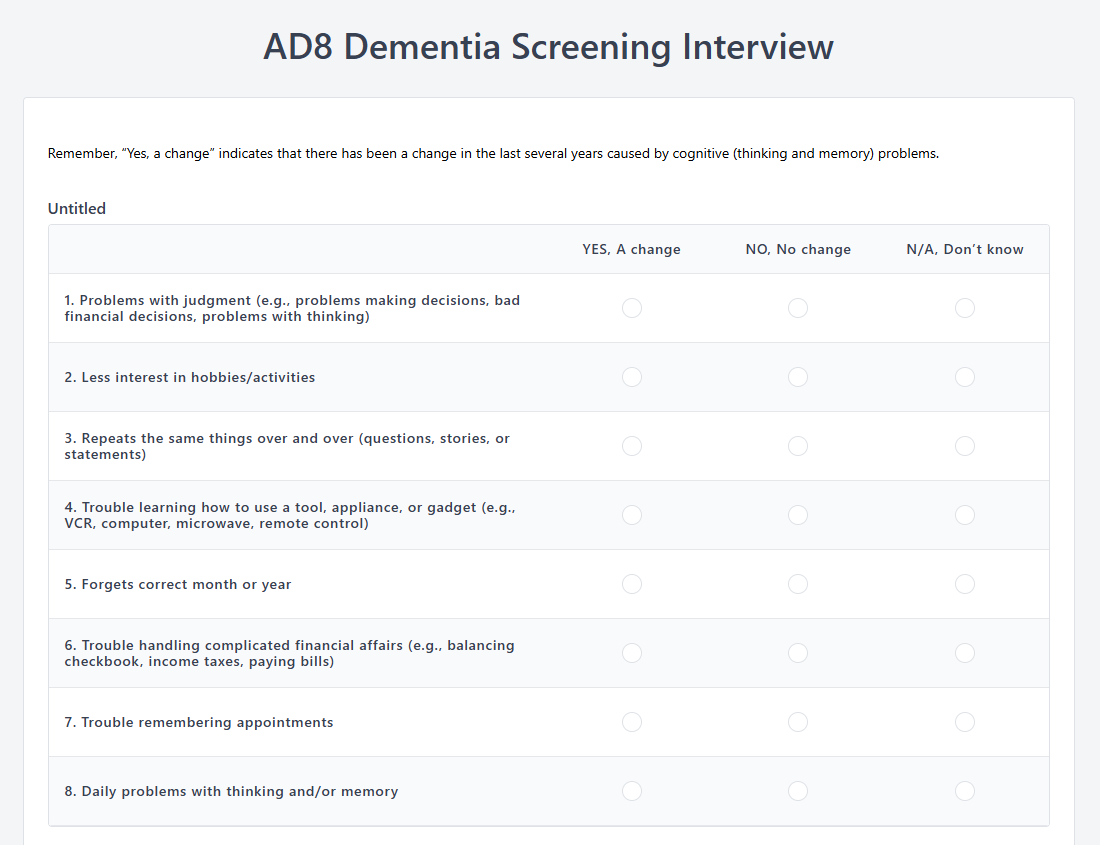

The AD8 Dementia Screening Interview is a widely recognized tool used to identify early signs of cognitive decline associated with dementia and other neurocognitive disorders. By transitioning this important assessment to a HIPAA-compliant digital platform, Zentake empowers healthcare professionals to conduct screenings more efficiently, securely, and accurately. Digitizing the AD8 helps clinicians streamline their cognitive evaluation processes while maintaining the highest standards of patient confidentiality and data protection. Get started today with Zentake’s secure, digital dementia assessment tools.
The AD8 (Ascertain Dementia 8-Item Informant Interview) is a brief screening tool designed to detect changes in an individual’s cognitive abilities that may signal early dementia. Developed by researchers at the Washington University Alzheimer’s Disease Research Center, the AD8 focuses on functional and memory-related changes observed by someone close to the patient—such as a family member or caregiver.
The AD8 consists of eight yes/no questions that assess key areas of memory, problem-solving, and everyday functioning. Each “Yes” response, indicating a change from prior behavior, is scored as one point. A total score of two or more typically suggests the presence of cognitive impairment warranting further clinical evaluation.
Early identification of dementia is critical for improving patient outcomes, guiding treatment planning, and supporting caregivers. The AD8 is particularly valuable in busy clinical environments where quick, reliable screening is needed to determine whether further neurocognitive testing is warranted.
Traditional paper-based AD8 forms require manual distribution, collection, and scoring—processes that can introduce errors, delays, and risks to patient data privacy. Zentake’s digital AD8 Dementia Screening Interview transforms this workflow into a seamless, secure experience.
With Zentake, clinicians can send the AD8 questionnaire electronically to informants, who can complete it remotely on any device. Once submitted, results are automatically scored, securely stored, and instantly available for review within the provider’s system.
Before Zentake:
A caregiver receives a printed AD8 form, fills it out at home, and returns it by hand or mail. Staff must manually transcribe the answers, score them, and input results into the patient record—introducing potential errors and time delays.
After Zentake:
The same caregiver completes the AD8 online via a secure, HIPAA-compliant Zentake link. Results are auto-scored, synced with the EHR, and accessible to clinicians instantly—saving administrative time and improving clinical accuracy.
This shift from paper to digital not only enhances data accuracy but also strengthens workflow efficiency and patient engagement.
Zentake revolutionizes how healthcare organizations administer and manage cognitive screening tools like the AD8. Designed for compliance, efficiency, and ease of use, Zentake’s platform supports digital transformation across every stage of the assessment process.
Implementing the AD8 digitally is simple yet impactful for clinical workflows. Zentake supports healthcare providers at every step, from setup to staff training.
Q1. Who can use the AD8 Dementia Screening Interview?
Any healthcare provider involved in cognitive health—such as primary care physicians, neurologists, psychologists, and geriatric specialists—can use the AD8 to identify early cognitive changes.
Q2. How long does it take to complete the AD8?
It typically takes less than five minutes for an informant to complete, making it ideal for busy clinical workflows.
Q3. Is the AD8 scientifically validated?
Yes. The AD8 has been extensively validated in clinical research as a reliable and sensitive tool for detecting early dementia and mild cognitive impairment.
Q4. Can Zentake integrate with my EHR system?
Absolutely. Zentake supports EHR integrations to ensure all digital assessments, including the AD8, flow seamlessly into your patient records.
Q5. How can I export or share results securely?
Results can be exported as encrypted files or securely shared within Zentake’s platform using role-based permissions to maintain compliance and confidentiality.